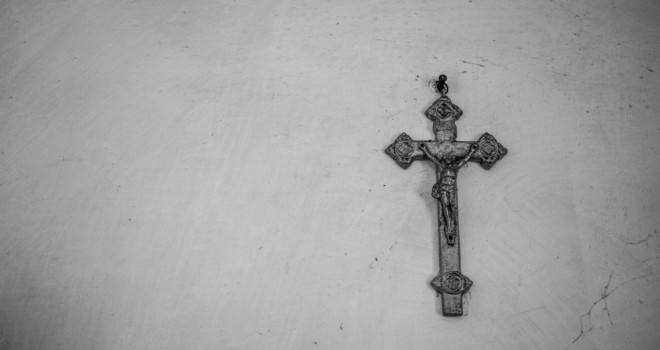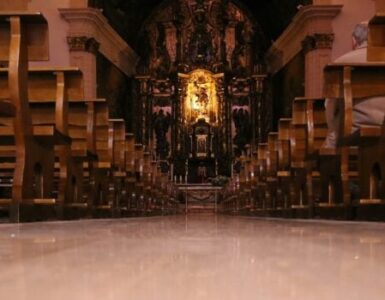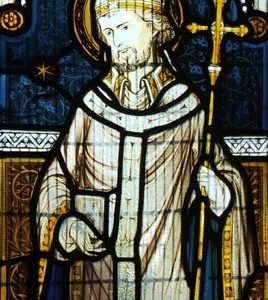Jesus, desiring to enrich us, first gave us his blood to purify us so that we might be able to receive the gifts he offers. O my dear Savior, you go out to the Garden of Olives, to the house of Caiaphas, to the praetorium of the Roman governor, and at last you climb Mount Calvary. Everywhere you go you pour out the blood of your new covenant, the blood by which our crimes are expiated and abolished.
Let us contemplate Jesus in his sorrowful Passion and see the precious blood of the new alliance flow forth, the blood by which we have been redeemed. It first flows in the Garden of Olives. The robes of my Savior are pierced, and the earth is moistened by the bloody sweat of his body. O God! What is this spectacle that so bewilders us? What is, rather, this mystery that both cleanses and sanctifies us?
Is not the answer that our Savior knew that our salvation was in his blood? And that from his ardent desire to save our souls, his blood burst forth, blood which holds within itself our life much more than his own? Thus it seems that this divine blood, so desirous of flowing forth for us, overflowed by the force of his charity, before any violence had been done to him. Let us rush with faith to receive this blood. “O earth, cover not this blood!” (cf. Job 16:18). It is poured out for our souls.
This unprecedented sweat reveals another mystery. In his desire to expiate our crimes, Jesus voluntarily abandoned himself to an infinite sorrow for all of our excesses. He saw them all, one by one, and was afflicted by them beyond measure, as if he himself had committed them, for he was charged with them before God. Yes, our iniquities poured upon him from every direction, so that he could say with David, “the torrents of iniquity troubled me” (Ps. 17:5, Douay-Rheims [RSV = Ps. 18:4]). This is why he said, “Now is my soul troubled” (John 12:27). This was the cause of the inexplicable anguish that brought him to pronounce these words: “My soul is very sorrowful, even to death” (Matt. 26:38).
The immensity of sorrow could, in fact, have dealt the death-blow itself, if Jesus had not restrained his soul, preserving it to endure greater evils and to drink the whole cup of his Passion. He nevertheless allowed his blood to overflow in the Garden of Olives to convince us that our sins — yes, our sins alone, without the executioner’s help — could have brought about his death. Can you believe that sin could have such great and evil power? If we only saw Jesus fall into the hands of the soldiers who scourged, tormented, and crucified him, we would blame his death only upon this torture. Now that we see him succumb in the Garden of Olives, where he has only our sins to persecute him, we may accuse ourselves. Let us weep, beat our breasts, and tremble in the very depths of our conscience.

How could we not be seized with fright, having ourselves, in our very hearts, so certain a cause of death? If sin alone sufficed to kill God, how can mortal men survive with such a poison in their bodies? No. We exist only by a continuous miracle of mercy. The same divine power that miraculously sustained the soul of the Savior, that he might endure the whole punishment, sustains ours that we might accomplish our penance, or at least begin it.
After our Savior had made his blood pour forth by the force of his afflicted charity alone, we can easily believe that he would not spare it from the cruel persecutors of his innocence. Wherever Jesus was during the course of his Passion, a furious cruelty wounded him again and again. If we were to accompany him to each of the places he went, we would see the bloody tracks that marked his way. The chief priest’s house, the Roman judge’s tribunal, the guard house where Jesus was handed over to the brutal insolence of the soldiers, and all the streets of Jerusalem are stained with the divine blood that purified Heaven and earth.
We should never come to an end should we attempt to consider all of the cruel circumstances in which this innocent blood was shed. It suffices to say that on this day of blood and carnage, on this day at once deadly and salvific, on which the powers of Hell were loosed upon Jesus Christ, he renounced his own power. While his enemies were able to do all that they wished, he voluntarily reduced himself to the condition of enduring all. By the effect of the same divine plan, God loosened the bridle of the envious and held back all the power of his Son. While all the powers of Hell were unchained, the protection of Heaven was withdrawn, so that Jesus was exposed naked and disarmed, powerless and without being able to resist, to anyone who wished to insult him.
After this, need we contemplate the infinite details of his sorrow? Need we consider how he was ruthlessly handed over to lackeys and soldiers to be the object of their bloody scorn and to suffer from their insolence every blow that their pitiless mockery and malicious cruelty could deal? Need we imagine this dear Savior allowing his body to feel the strength of these executioners, their hard scourge upon his back, the sharp spines upon his head? O divine Jesus! How much blood did it cost the God-man to win our salvation!
The new covenant was not yet sealed, for his veins had not yet been emptied upon the Cross. We must consider the sufferings of a man whose limbs are bruised and broken by a violent hanging, no longer even feeling his wounds, hanging from hands torn by the weight of his body, completely beaten by the loss of his blood. Amid this excessive pain, he was lifted up, it seemed, for the sole purpose of seeing the crowd of people mock him and laugh at his deplorable condition. After all this, could we be surprised if Jesus were to ask, “Is there any sorrow like my sorrow?” (cf. Lam. 1:12).
Our hearts should be made tender by this pitiable sight. We must not leave the great spectacle of Calvary with dry eyes. There is no heart so hardened that it can see human blood spilled and not be moved. But the blood of Jesus gives our hearts the grace of compunction, which is the emotion of penitence. Those who remained near his Cross and watched him breathe his final breath, “returned home beating their breasts” (Luke 23:48). Jesus Christ, dying a cruel death and spilling his innocent blood, poured out a spirit of compunction and penitence upon the whole of Mount Calvary. We must not let our hearts be hardened. Let us make Calvary echo with the sound of our sobbing. Let us weep bitter tears for our sins and turn against ourselves with a holy anger. Let us break all our unworthy habits and leave behind our worldly lives. Let us carry in ourselves the death of Jesus Christ.
✠
This article is adapted from a meditation in Bishop Bossuet’s Meditations for Lent. It is available as an ebook or leatherette from your local Catholic bookstore or online through Sophia Institute Press.
Photo by Dejan Livančić on Unsplash












